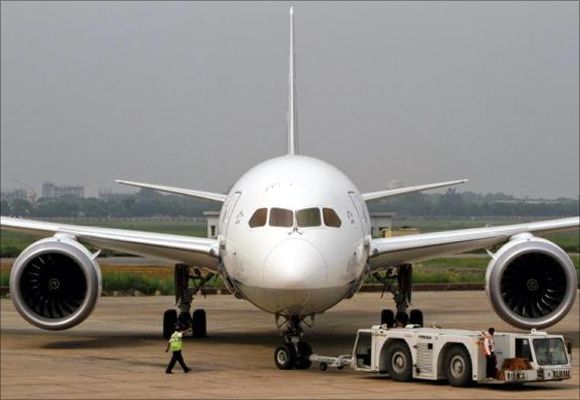 The country is likely to become the third largest aviation market by 2020, claimed a report published on Thursday, the second day of the India Aviation Exhibition and Conference.
The country is likely to become the third largest aviation market by 2020, claimed a report published on Thursday, the second day of the India Aviation Exhibition and Conference.
The report, called “India Aviation Report”, has been prepared by KPMG and Ficci.
It claimed that with 81 million trips, India’s domestic aviation market grew over 20.3 per cent in 2015 -- the highest ever growth rate recorded in the world.
“In January 2016, the passenger growth was 22 per cent.
Some people attribute this growth to fall in crude prices, but no other country in the world has achieved this kind of growth during the period,” said R N Choubey, secretary, Ministry of Civil Aviation, at the launch event.
According to the report, the Indian civil aviation sector has exhibited tremendous resilience to the global economic slowdown and ranks ninth in the global civil aviation market.
This is largely attributed to the growing economy, increased competition among airlines, especially among low-cost carriers, modern airports, greater use of technology, foreign direct investment and increased emphasis on regional connectivity.
The report observed that the National Civil Aviation Policy (NCAP-2016), which is likely to be out next month, would provide a significant fillip to the sector.
The various fiscal and monetary incentives, liberal policies focused on ease of doing business and enhanced push for regional and global connectivity are extremely positive.
The growing competition among the states would provide a further fillip to the growth of India as well as its aviation sector, said Union Civil Aviation Minister Ashok Gajapathi Raju.
The minister also launched the “India Aviation Report”.
The report suggests that aspects such as increasing disposable incomes, fall in prices of aircraft turbine fuel, increase in tourism, and visa reforms have placed India in a unique position.
This brings the country closer to achieving its vision of becoming the largest aviation market by 2030, it said.
Steps taken to revive 160 airports and make them operational will improve air connectivity to regional and remote areas.
Public-private partnerships in the sector will get substantial support from states in terms of financing, concessional land allotment, tax holiday and other incentives, the report suggests.
“Enormous growth in domestic passenger traffic, substantial strengthening through government initiatives, decrease in global crude oil prices and airlines showing profits indicate a significantly positive transformation for the Indian civil aviation market.
"The close partnership between the government and the sector in ongoing and future projects will further improve regional connectivity.
"I am certain that the sector will take complete advantage of the positive momentum and help sustain the growth,” said Harshavardhan Neotia, president, Ficci.
According to Amber Dubey, a partner and the India head of aerospace and defence of KPMG, the positive impact of NCAP-2016, rise in disposable incomes and the fall in ATF prices are likely to help India leapfrog into the top three of the world.
India registered a growth of 17.1 per cent in the total passenger throughput for financial year 2015-16.
Till January 2016, it was 184 million. Passenger throughput is expected to reach around 370 million by 2020, with domestic traffic constituting around 80 per cent of the total throughput.
According to International Air Transport Association, passenger traffic on international routes showed an increase of 6.5 per cent in 2015 compared to 2014.
In comparison, between April and December 2015, international passenger throughput at Indian airports grew at 7.7 per cent.
The report suggests that in order to ensure high growth, it is imperative to broaden the base of domestic flyers through greater air connectivity in Tier-II and –III cities.
Many Indian states have taken positive initiatives, developing airports, reduction in sales tax rates on ATF and direct subsidy to airlines for improvement of connectivity, according to the report.
FLYING HIGH
According to a Ficci-KPMG report, India will be the third largest aviation market by 2020
Heights scaled
- In 2015, India’s domestic aviation market clocked 81 million flights
- Grew 20.3%
Boost factors
- Growing economy
- Increased competition, low-cost carriers
- Modern airports
- Greater use of technology
- Foreign direct investment
- Increased emphasis on regional connectivity
Eye on future
- Increasing disposable incomes
- Fall in ATF prices
- Increase in tourism
- Visa reforms
Image: A Boeing 787 Dreamliner aircraft at the Indira Gandhi international airport in New Delhi. Photograph: Mansi Thapliyal/Reuters











